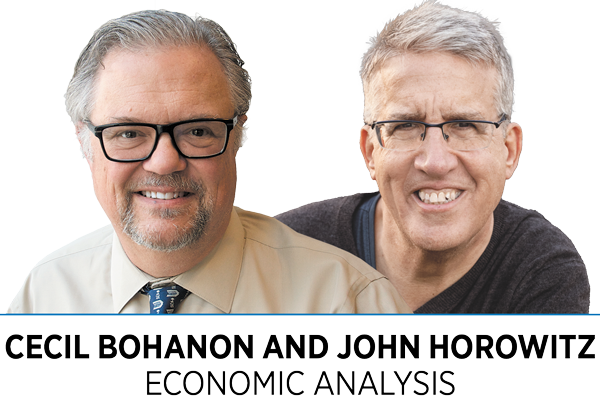Subscriber Benefit
As a subscriber you can listen to articles at work, in the car, or while you work out. Subscribe Now Manhattan Institute Senior Fellow Brian Riedl recently wrote a policy paper on 10 tax myths. Two of the myths he discussed are: 1) The U.S. government can increase tax revenue by cutting tax rates. 2) Increasing taxes on wealthy households would dramatically reduce the chronic federal budget deficits that currently stand at 6% of U.S. gross domestic product. He notes that both of the claims are false.
Manhattan Institute Senior Fellow Brian Riedl recently wrote a policy paper on 10 tax myths. Two of the myths he discussed are: 1) The U.S. government can increase tax revenue by cutting tax rates. 2) Increasing taxes on wealthy households would dramatically reduce the chronic federal budget deficits that currently stand at 6% of U.S. gross domestic product. He notes that both of the claims are false.
Some claim that cutting tax rates will increase revenue collection. For example, suppose Humbug County imposes a 1% tax on all real estate transactions and has $7 billion in real estate transactions, collecting $70 million in tax revenue.
We can be pretty sure that if the county lowers its tax rate to 0.5%, more real estate transactions will occur. But for the lower tax rate to increase tax revenue, real estate transactions would have to more than double, to $14 billion or more. While possible, it is a form of magical thinking to insist that lower tax rates will always raise tax revenue.
Riedl points out that the marginal personal income tax rate, where lowering the tax rate will yield more revenue, is estimated to be 55% to 73%. He correctly notes this is “well above current rates” for almost everyone. So, while it is theoretically possible for tax cuts to increase federal revenue, it is delusional to think they are a viable deficit-busting strategy.
Riedl also writes that taxing the rich would not solve the budget deficit. The tax rate on many of the highest-income earners is close to its maximum yield. The current top marginal federal income tax rate is 37%, plus 1.45% to 2.90% for the Medicare portion of the payroll tax, plus state and local income tax rates as high as 14% in some jurisdictions, making for an overall rate that is near 55% for some.
The potential for additional revenue from taxing the high-income earners is limited. In a separate paper, Riedl points out that even under the most optimistic assumptions, tax-the-rich schemes could yield the federal government only around 2% of GDP. So, while it is theoretically possible for tax hikes on the wealthy to generate more tax revenue, it is delusional to think of it as a viable deficit-busting strategy.
The reality of our national fiscal mess is troubling. But to paraphrase the great economist Thomas Sowell, “Reality is not optional.”•
__________
Bohanon and Horowitz are professors of economics at Ball State University. Send comments to [email protected].
Please enable JavaScript to view this content.

Maybe add better controls on state and federal grants. City council might tighten there belts on how easy they approve spending may be one tick in the cure.
It all plays a role. 26 trillion is going to break the bank sooner than later.
Messrs. Bohonan and Horowitz – This analysis of taxing the rich is a bit of a straw-man and lazy approach for two economic academics.
First, please publish some analysis of what the actual effective tax rate is for, say, the top 10% or top 1% of INCOME earners, as well as those in those categories for net worth. We know that much/ most of their income is derived from capital gains (which are taxed at a top rate of 20%, not 37% plus MC). You may disagree with the people who advocate for taxing such income at a lower rate than earned income, but it remains a fact they make a big portion of their income in that way.
Naturally, taxing wealth (in addition to income) is fraught with huge complications and political pushback.
Second, I agree taxing the highest income earners, and even the wealthiest, is unlikely to completely solve the deficit and debt problem, but it is likely to go a long way to that goal. Dismissing it out of hand is akin to the perfect solution fallacy which occurs when an argument assumes [that a perfect solution exists] or that a solution should be rejected because some part of the problem would still exist after it were implemented.
You can do better.
+1
If you’re not proposing tax increases as part of solving the deficit, you’re wasting everyone’s time.